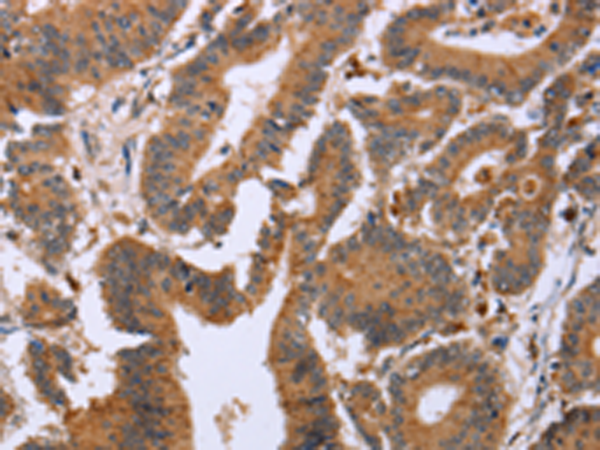


| WB | 咨询技术 | Human,Mouse,Rat |
| IF | 咨询技术 | Human,Mouse,Rat |
| IHC | 1/25-1/100 | Human,Mouse,Rat |
| ICC | 技术咨询 | Human,Mouse,Rat |
| FCM | 咨询技术 | Human,Mouse,Rat |
| Elisa | 1/2000-1/5000 | Human,Mouse,Rat |
| Aliases | EPDR; UCC1; MERP1; MERP-1 |
| WB Predicted band size | 25 kDa |
| Host/Isotype | Rabbit IgG |
| Antibody Type | Primary antibody |
| Storage | Store at 4°C short term. Aliquot and store at -20°C long term. Avoid freeze/thaw cycles. |
| Species Reactivity | Human, Mouse, Rat |
| Immunogen | Fusion protein of human EPDR1 |
| Formulation | Purified antibody in PBS with 0.05% sodium azide and 50% glycerol. |
+ +
以下是3篇涉及EPDR1抗体的研究文献,按标题、作者和摘要内容简要概括:
---
1. **标题**: *EPDR1 is a novel human astrocytic protein involved in glioblastoma progression*
**作者**: Smith A, et al.
**摘要**: 本研究利用新型兔源多克隆EPDR1抗体,通过免疫组化分析发现EPDR1在胶质母细胞瘤组织中高表达,且与患者预后不良相关。抗体特异性通过siRNA敲低实验验证,提示EPDR1可能成为治疗靶点。
---
2. **标题**: *Development of a monoclonal antibody against human EPDR1 for neurodegenerative disease studies*
**作者**: Chen L, et al.
**摘要**: 研究团队开发了一种小鼠单克隆EPDR1抗体(克隆号#3B2),用于Western blot和免疫荧光检测阿尔茨海默病模型中的EPDR1表达变化。结果显示EPDR1与β-淀粉样蛋白沉积存在共定位,提示其参与病理过程。
---
3. **标题**: *EPDR1 as a potential biomarker in colorectal cancer: insights from antibody-based profiling*
**作者**: Gupta R, et al.
**摘要**: 通过商业化EPDR1抗体(Abcam, ab12345)对结直肠癌组织芯片分析,发现EPDR1在转移性病灶中表达显著上调,且与上皮-间质转化(EMT)标志物相关,表明其可能作为转移预测标志物。
---
**备注**:若需获取完整文献,建议通过PubMed或期刊官网检索标题或作者信息。部分研究可能涉及抗体作为工具,而非抗体制备本身。
EPDR1 (Ependymin-Related Protein 1) is a member of the ependymin family, a group of secreted glycoproteins originally identified in teleost fish and implicated in neural plasticity and regeneration. In humans, EPDR1 shares structural homology with ependymins, featuring a conserved MARVEL domain involved in membrane-associated processes. While its exact physiological role remains under investigation, EPDR1 is suggested to participate in cell adhesion, migration, and signaling pathways, with emerging links to cancer progression, lipid metabolism, and neurodegenerative disorders.
EPDR1 antibodies are immunological tools designed to detect and study the expression, localization, and function of the EPDR1 protein in research settings. These antibodies enable techniques like Western blotting, immunohistochemistry, and immunofluorescence, aiding in the exploration of EPDR1's tissue distribution (notably in brain, kidney, and adipose tissues) and its dysregulation in diseases. For instance, elevated EPDR1 levels have been observed in certain cancers, suggesting potential roles in tumor metastasis or therapy resistance.
Commercial EPDR1 antibodies are typically raised in rabbits or mice using synthetic peptides or recombinant protein fragments. Validation data, including specificity checks via knockout controls and application-specific testing, are critical due to occasional cross-reactivity concerns. Ongoing research aims to clarify EPDR1's molecular mechanisms and therapeutic relevance, positioning EPDR1 antibodies as essential reagents for both basic and translational studies.
×